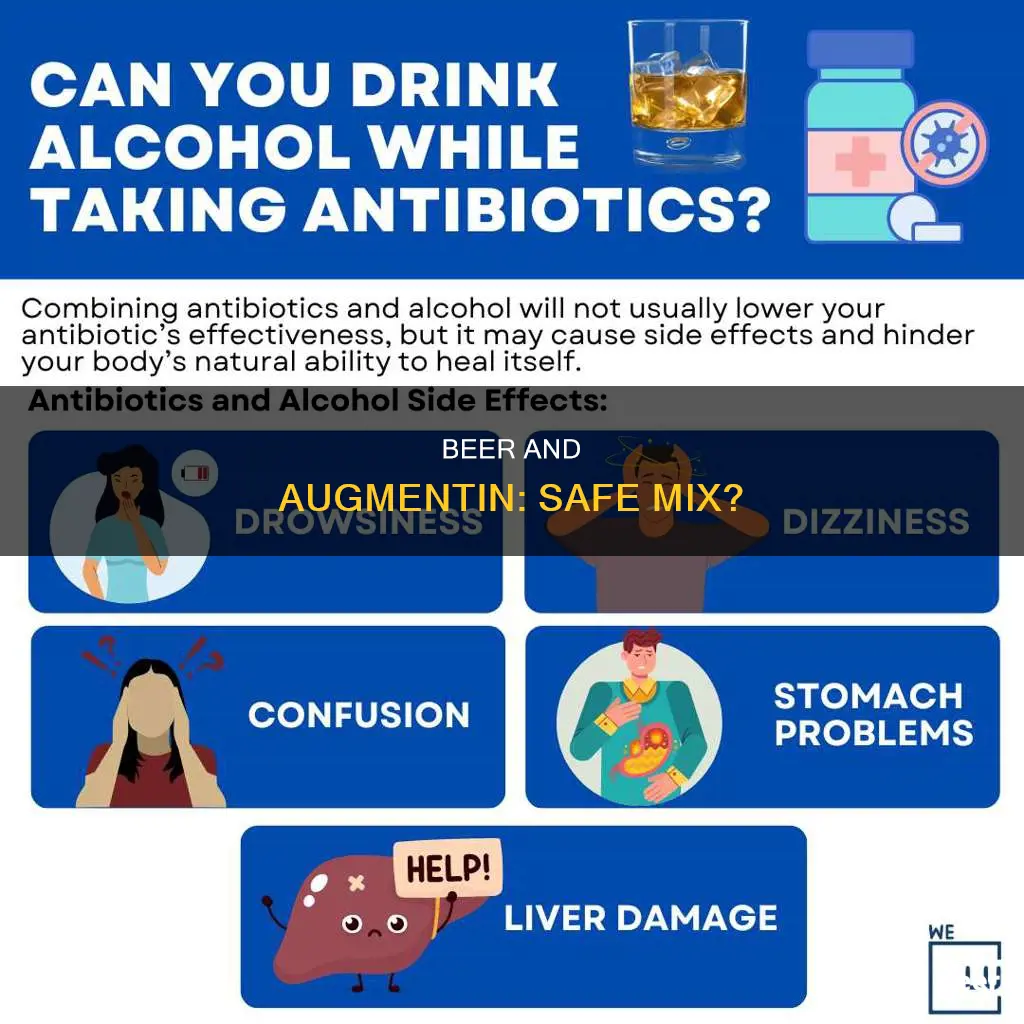
Augmentin is a prescription drug used to treat bacterial infections in both adults and children. It is not known to interact with alcohol, but drinking while taking the medication could worsen some of its side effects, such as nausea, vomiting, and liver problems. Although alcohol will not stop Augmentin from working, it is still recommended to avoid it to give your body the best chance to fight the infection.
| Characteristics | Values |
|---|---|
| Can I drink beer while taking Augmentin? | Yes, there is no known interaction between Augmentin and alcohol. |
| Is it safe? | It is generally considered safe to drink alcohol while taking Augmentin as it will not stop the medication from working. However, drinking alcohol while taking Augmentin could worsen some of the medication's side effects, such as nausea, vomiting, and liver problems. |
| Recommendations | It is recommended to consult a doctor before drinking alcohol while taking Augmentin, as they can advise on whether to limit alcohol consumption during the treatment. Many health professionals recommend avoiding alcohol to give the body the best chance to fight the infection. |
What You'll Learn
- Augmentin and alcohol do not have a known interaction
- Drinking alcohol while taking Augmentin can worsen side effects like nausea and vomiting
- Alcohol does not stop Augmentin from working
- Drinking alcohol while taking antibiotics is generally not recommended
- Alcohol can hinder the body's ability to recover from an infection

Augmentin and alcohol do not have a known interaction
Augmentin (amoxicillin/clavulanate) is a prescription drug used to treat bacterial infections in adults and children. Examples include urinary tract infections (UTIs), ear and sinus infections, and skin infections. As with other medications, it is essential to consult with your doctor or pharmacist before taking Augmentin to ensure it is safe for you. They will be able to advise you on any potential risks or side effects based on your medical history and other factors.
It is worth noting that while Augmentin itself does not have a known interaction with alcohol, certain antibiotics do. For example, drinking alcohol with antibiotics such as Metronidazole, Tinidazole, or Bactrim can result in severe reactions, including flushing, headache, nausea, vomiting, and rapid heart rate. Therefore, it is always important to check with your healthcare provider before consuming alcohol while taking any medication.
Mixing Beer and Whisky: A Dangerous Cocktail?
You may want to see also

Drinking alcohol while taking Augmentin can worsen side effects like nausea and vomiting
While drinking alcohol while taking Augmentin won't stop the medication from working, it may increase your risk of certain side effects or make them worse.
Therefore, if you're taking Augmentin, it's a good idea to avoid alcohol to give your body the best chance to fight the infection and to lower the risk of adverse side effects. If you drink alcohol, talk to your doctor about how much, if any, is safe to consume while you're taking this medication.
Antidepressants and Alcohol: Is It Safe to Mix?
You may want to see also

Alcohol does not stop Augmentin from working
Augmentin is a brand-name prescription drug that treats bacterial infections in adults and children. It is used to treat conditions such as urinary tract infections (UTIs), ear and sinus infections, and skin infections. As with other medications, Augmentin can interact with certain drugs, including oral blood thinners and oral birth control. However, it is not known to interact with alcohol, supplements, or food.
While alcohol does not stop Augmentin from working, it is generally recommended to avoid drinking alcohol while taking antibiotics. This is because alcohol can hinder the body's ability to recover from a bacterial illness, as it interferes with essential processes such as sleep and hydration. Additionally, both alcohol and antibiotics can affect cognitive function, concentration, and coordination. Therefore, it is advisable to refrain from drinking alcohol while taking antibiotics to give your body the best chance to fight the infection.
Beer on Board: Drinking Beer on Small Flights
You may want to see also

Drinking alcohol while taking antibiotics is generally not recommended
It is important to note that drinking alcohol can lead to dehydration, interrupt normal sleep, and may hinder the body's natural ability to heal itself. Additionally, both alcohol and antibiotics can negatively affect cognitive function, concentration, and coordination. Therefore, it is advisable to avoid alcohol consumption during antibiotic treatment to ensure optimal recovery from a bacterial infection.
Furthermore, certain types of antibiotics, such as Metronidazole, Tinidazole, and Bactrim, are known to cause severe reactions when combined with alcohol. Consuming alcohol with these antibiotics can result in various side effects, including flushing, headache, nausea, vomiting, and rapid heart rate. In some cases, mixing alcohol with antibiotics can also damage vital organs, including the liver and kidneys.
It is always best to consult with a doctor or pharmacist before consuming alcohol while taking any medication, including Augmentin, to ensure safe and effective use.
Beer and Xeralto: Safe Mix or Health Risk?
You may want to see also

Alcohol can hinder the body's ability to recover from an infection
While Augmentin is an antibiotic that can be consumed with alcohol, it is still recommended that you refrain from drinking if you have an infection. This is because alcohol can hinder the body's ability to recover from an infection in several ways.
Firstly, alcohol can directly inhibit the effectiveness of antibiotics, which are powerful medications that destroy or slow down the growth of bacteria. By hindering the effectiveness of antibiotics, alcohol can make it harder for your body to fight off the infection.
Secondly, alcohol can cause a range of negative side effects, including gastrointestinal issues such as nausea, vomiting, and diarrhoea. These side effects can be amplified when alcohol is mixed with antibiotics, and can lead to additional side effects like dizziness, drowsiness, headaches, and even seizures.
Thirdly, alcohol interferes with essential bodily processes such as sleep and hydration, which are critical components of recovering from a bacterial illness. Adequate sleep and hydration are necessary for the body to heal and fight off infections.
Finally, alcohol can have negative effects on the immune system, which is responsible for fighting off infections. Alcohol can cause immune deficiency in the gut and respiratory mucosa, making it harder for the body to defend against pathogens.
In conclusion, while it may be tempting to reach for an alcoholic beverage when you're feeling unwell, it's best to avoid alcohol if you're taking antibiotics for an infection. This will give your body the best chance to fight the infection and recover as quickly and effectively as possible.
Brewery Workers: Beer Drinking on the Job?
You may want to see also
Frequently asked questions
Yes, there is no known interaction between Augmentin and alcohol. However, drinking alcohol while taking Augmentin could worsen some of the drug's side effects, such as nausea and vomiting or liver problems. It is recommended that you talk to your doctor about how much, if any, alcohol is safe to drink while taking Augmentin.
Augmentin (amoxicillin/clavulanate) is a prescription drug used to treat bacterial infections in adults and children. Examples include urinary tract infections (UTIs), ear and sinus infections, and skin infections.
The most common side effects of Augmentin include nausea, vomiting, diarrhoea, and allergic reactions such as rashes. In rare cases, Augmentin can also cause liver problems, including liver damage.
No, alcohol should be avoided while taking other antibiotics such as Metronidazole, Tinidazole, and Bactrim as the combination may result in a severe reaction and negative side effects.
Yes, Augmentin can interact with certain drugs, including blood thinners and oral birth control pills, reducing their effectiveness. It is important to inform your doctor and pharmacist about any other medications or supplements you are taking to prevent potential interactions.







